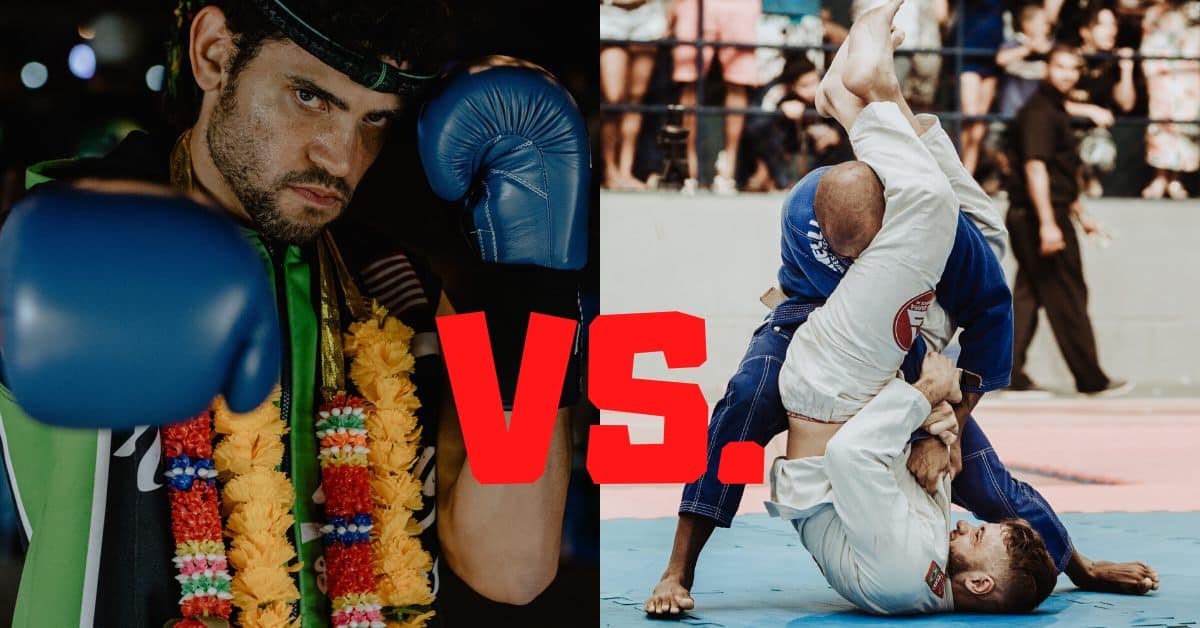In one of our earlier articles, we discussed the differences between Muay Thai and other sports, like boxing, kickboxing, and MMA, and we’ve seen their similarities and differences. Today, we will compare it to the South American grappling martial art, of Brazilian Jiu-Jitsu (BJJ). As we know already, Muay Thai is an Oriental martial art created in Thailand, while BJJ is a relatively new martial art or combat sport that stems from South America.
We will compare these two sports to show you the differences and similarities between these two sports. Keep reading to find out more!
Muay Thai vs. BJJ: Historical Development and Generalised Differences
Muay Thai (Thai: มวยไทย), literally “Thai boxing ring,” is an Oriental martial art and combat sport that originated in Thailand somewhere during the 18th century. It is a full-contact discipline that is also known as the “art of eight limbs” and is heavily reliant on the use of fists, elbows, knees, and shins. It originated as a fighting technique used in wars; Muay Thai soon became both a martial art and fighting sport used outside its original setting.
After more than a century of development in the Far East, Muay Thai became extremely popular in the West during the 20th and 21st centuries. Western practitioners from Thailand started using the discipline in kickboxing and MMA competitions, thus introducing and popularising Muay Thai in the West. Today, Muay Thai is a global combat sport practiced worldwide and is internationally governed by the IFMA.
Brazilian Jiu-Jitsu (BJJ) (Portuguese: jiu-jitsu brasileiro) is a self-defense martial art and combat sport based on grappling, ground fighting, and submission holds. BJJ focuses on controlling one’s opponent, gaining a dominant position over him, and using several specialized techniques to force them into submission via joint locks or chokeholds.
Brazilian Jiu-Jitsu was first developed and modified in the 1920s by Brazilian brothers Carlos, George, and Hélio Gracie after Carlos was taught traditional Kodokan judo by a traveling Japanese judoka called Mitsuyo Maeda in 1917; the brothers later went on to develop their self-defense system named Gracie Jiu-Jitsu, which is not that different from traditional BJJ, but it’s still very distinctive.
BJJ eventually came to be its defined combat sport through the innovations, practices, and adaptation of Gracie Jiu-Jitsu and Judo, with governing bodies such as the IBJJF working worldwide, becoming an essential martial art for MMA
This is the basic overview of the two sports/arts we will compare in this article. Now that you’ve seen all the generalities, we can continue with more specific questions to see how the two compare in certain aspects.
Muay Thai vs. BJJ: Which Is Better for Self-Defense?

Self-defence is the art of using specifically taught moves to defend yourself from an unwanted attack on your person. Although some skills and techniques specifically teach self-defense, most combat sports and martial arts include some degree of self-defense courses, including Muay Thai and Brazilian jiu-jitsu. But, when it comes to self-defense, which is better?
Regarding self-defense, Brazilian jiu-jitsu is pretty practical and immensely helpful. One of the reasons is that BJJ is an a grappling art that relies on self-defense much more than other martial arts and combat sports; some people even call it a self-defense technique, a phrase usually used to describe Krav Maga. Brazilian jiu-jitsu relies on the fact that a smaller opponent could and will overpower and grab a more prominent and nominally stronger opponent.
BJJ uses specific techniques for such reactions in a fight or a tight spot. BJJ also utilizes a lot of ground fighting, which can be extremely useful when defending yourself. The ultimate move of BJJ is the “rear naked choke,” which is so users that it can finish a fight but not cause any long-term damage to your opponent.
On the other hand, Muay Thai has a more balanced and less complete approach. Namely, Muay Thai utilizes all extremities, meaning that the disadvantages boxing has when legs are concerned are annulled in Muay Thai, which relies primarily on legwork while – at the same time – using punches.
Muay Thai is also specific because it requires patience, meaning that it will teach you endurance, which can be essential when defending yourself. Muay Thai focuses on waiting for the right moment to attack, which can prove crucial in a tight spot. The difficulty of Muay Thai’s self-defense is that Muay Thai doesn’t have ground movements, which can be potentially problematic in an actual fight.
To conclude, Brazilian jiu-jitsu and Muay Thai help with self-defense but have different approaches and results. Thus, if you want to approach self-defense comprehensively, allowing for better efficiency in an actual fight, Brazilian jiu-jitsu is your choice. Still, if you want to practice a more balanced, standing-based approach, you can benefit from practicing Muay Thai.
Also, check out our list of best martial arts for self-defense, an article with an in-depth review of Muay Thai for self-defense, and a comparison of Muay Thai and Krav Maga for self-defense.
Muay Thai vs. BJJ: Which Is Easier to Learn?

An important factor in choosing your sport is how difficult it is to learn. All combat sports and martial arts are challenging in their ways, and – ultimately – it all depends on your strength and determination. Still, some of these are naturally more complex and more difficult to learn if you’re a beginner.
Muay Thai is an all-encompassing, striking martial art that involves kicks, elbows, knees, and punches. It takes more time to master all the techniques and approaches before you can fully appreciate its benefits. Not only do you need to learn how to use these types of shots, but you also have to learn how to defend yourself against them. Clinching is also very important in Muay, which takes a long time to master completely.
But how does it compare to Brazilian jiu-jitsu? When compared to BJJ, Muay Thai is a piece of cake. In Muay Thai – you (put) just fight. You stand on your feet and try to block your opponent’s shots while trying to attack him simultaneously.
In Brazilian jiu-jitsu, you have an opponent that wants to either choke you or break your limbs, and that’s not easy to defend! Since they use special techniques, you must know how to protect against them. It isn’t easy to learn all those moves and techniques, but the thing with BJJ is that – if you stick around long enough, you’ll eventually learn everything you need to know. At one point, it practically becomes routine.
So, which one is easier to learn? If you’re a beginner, it’s Muay Thai. Techniques practiced in Muay Thai are much less complex than the ones used in BJJ, and you will need a lot of time to master all the methods in Jiu-Jitsu. But, once you get the hang of it, Muay Thai and BJJ become equally tricky.
Muay Thai vs. BJJ: Which Is Better for Strength, Cardio, and Fitness?
As far as fitness goes – although that is not very often the main reason one takes up a martial art or combat sport – both Muay Thai and Brazilian jiu-jitsu offer plenty to the practitioners. They are both great for your health, general fitness and stamina, and even the cardiovascular system (many people do cardio exercises combined with martial arts techniques).
Even in their pure forms, both are also great for strength and conditioning. Although Muay Thai puts more focus on the legs – thus strengthening your lower body – and Brazilian jiu-jitsu puts more emphasis on rolls and ground fighting, when it comes to general fitness, both are equally effective.
The endgame depends on you, i.e., how you approach the sport, how much you work, etc. Both arts offer a lot to you regarding fitness, so it depends on how you approach it, but if you close it comprehensively, expect to be crawling back home on all fours.
Muay Thai vs. BJJ: Who Would Win in a Fight?
The question is both and is not difficult to answer. Namely, you have to consider several essential factors when answering this question. Some of them are – a fighter’s experience, physique, conditions, etc., but there is also the question of how the fight is executed.
In a sanctioned fight, a lot would depend on the fighters’ location. Brazilian jiu-jitsu fighters may have the upper hand because they are better prepared to defend against various situations. Still, that advantage will not be overly emphasized in a fight on the feet.
On the other hand, if a BJJ fighter manages to get the Muay Thai fighter on the ground, the latter would hardly stand a chance against the more experienced ground fighter. Muay Thai has no ground techniques, and it is not realistic to expect a Muay Thai fighter to stand his ground (pun intended) against an expert ground fighter such as someone versed in Brazilian jiu-jitsu.
As for unsanctioned fights would depend on many different factors we cannot predict or control from this position. Other attributes might play a significant role in such situations, which is why it is tough to predict the outcome. Again, a Brazilian jiu-jitsu fighter should have a slight advantage, but since there are no rules – one could never tell how such a fight might end.
Muay Thai vs. BJJ: Which Is Safer?

We’ve already discussed the dangers of boxing in some [earlier articles] and deduced that, compared to most other combat sports, boxing is usually more dangerous for the fighters. But that works for boxing, and this article is not about boxing. So, how difficult are Muay Thai and Brazilian jiu-jitsu?
Compared to boxing, even these two, every martial art is statistically safer. The statistics for Brazilian jiu-jitsu are generally good, and there are not many reported cases; the reported incidents are more anecdotal than alarming.
This lies in the fact that Brazilian jiu-jitsu fighters know their strengths and weaknesses. They know how dangerous a technique can be and can either forfeit the fight at the right moment or – from the other perspective – stop it before it gets too tricky. This is not the case in other sports, where a fighter can hardly appreciate the full strength of his shot.
Muay Thai confirms what we’ve said. Although it uses more shots, Muay Thai is generally safer than boxing because it’s not as aggressive, and it doesn’t focus on the head that much. Indeed, you can expect injuries, but fatalities, long-term head injuries, and similar problems are rare. Muay Thai fighters, because they can, by their art, don’t have to go just for the head, significantly decreasing the risk of fatal or threatening injuries.
Conclusion: Which One Should You Choose?
This question could also be paraphrased as – which is better, Muay Thai or Brazilian jiu-jitsu? The answer is not straightforward and depends on you and your approach.
You must know what you want, what you want to improve, and how to develop your fighting techniques. Based on your preferences, you will decide which one you prefer, Muay Thai or Brazilian jiu-jitsu, because each one offers something, so it’s up to you to make the final choice.
If you want to learn a standing style that utilizes the whole body in a fight to gain the upper hand, you should think that Muay Thai could be your “poison of choice” in martial arts. If, on the other hand, you want to fight more on the ground and utilize such techniques, Brazilian jiu-jitsu might be a better choice because it encompasses both standing and ground techniques, which might fit your preferences perfectly.
But again – as we’ve stated – the final decision is yours. Consider what you know and want before making the final choice that could influence your life in ways you cannot even imagine.
Well, that covers the fundamental differences between Muay Thai and Brazilian jiu-jitsu. If you want to find out if Muay Thai is better than MMA, follow our link, and if you want to know more about the world of mixed martial arts, please follow us and see you next time.
Frequently Asked Questions Anout Muay Thai and BJJ Compared
What is the main difference between muay thai and brazilian jiu jitsu?
A: The primary difference lies in the focus of each martial art. Muay Thai is a striking martial arts and art that utilizes punches, kicks, elbows, and knees as its primary techniques. On the other hand, Brazilian Jiu-Jitsu emphasizes ground combat, leveraging positions, and submission grappling to control and defeat an opponent.
In MMA, is it more beneficial to train bjj or muay thai?
A: Both BJJ and Muay Thai have their unique benefits and many MMA fighters train in both. BJJ offers comprehensive ground game techniques which is crucial if the fight goes to the ground. Meanwhile, Muay Thai provides effective striking techniques that can result in a technical knockout. A well-rounded fighter proficient in both would have an advantage in MMA fights.
When it comes to self-defense, which martial art is better, jiu-jitsu or muay thai?
A: Both Brazilian Jiu-Jitsu and Muay Thai can be effective for self-defense, depending on the situation. Jiu-Jitsu is highly effective at neutralizing an opponent on the ground, making it ideal for one-on-one encounters. Muay Thai, on the other hand, excels in stand-up striking and controlling distance. Context is key, and training in both can equip you with versatile self-defense skills.
How physically demanding is the training for bjj vs muay thai?
A: Both BJJ and Muay Thai are physically demanding in their ways. Muay Thai requires a unique blend of aerobic and anaerobic movements, which can make it more physically demanding in terms of cardiovascular endurance. On the other hand, BJJ exercises muscle groups and requires strength, flexibility, and tactical thinking, making it intellectually challenging.
I’m in Muay Thai class but considering adding bjj training. Will it help me become a more complete fighter?
A: Absolutely, adding BJJ training to your routine can complement your Muay Thai skills, making you a more well-rounded martial artist. Muay Thai can equip you with effective striking techniques, while the BJJ classes will provide you the skill set to defend yourself once you’re taken to the ground. This combination will bring you closer to becoming a complete fighter.
Who are some famous MMA fighters who train both in Bjj and muay Thai?
A: Many MMA fighters have trained in both BJJ and Muay Thai. Notable examples include Anderson Silva, a black belt in BJJ and proficient in Muay Thai, and Georges St. Pierre, who effectively integrated Muay Thai and BJJ in his fighting style.
How effective are bjj and muay thai in a street fight?
A: BJJ and Muay Thai can be valuable in street fights. Muay Thai equips you with powerful striking techniques for quickly neutralizing an attacker. Brazilian Jiu-Jitsu is especially useful if the confrontation ends up on the ground, allowing you to use your opponent’s strength against them with submission techniques.
What is the influence of the Gracie family on Brazilian Jiu-Jitsu?
A: The Gracie family has had a significant influence on Brazilian Jiu-Jitsu. It was Carlos Gracie and his brothers who adapted the traditional Japanese Jiu-Jitsu techniques which focused more on ground game and submissions. This adaptation led to the development of what is known today as Brazilian Jiu-Jitsu. Royce Gracie, another member of the Gracie family, showed the effectiveness of BJJ in the first few Ultimate Fighting Championship (UFC) tournaments.
What is the origin of Muay Thai?
A: Muay Thai, also known as Thai kickboxing, originated in Thailand as a battlefield fighting skill known as Muay Boran. Over time, it transitioned from unarmed combat into a sport. Its reputation grew due to its powerful strikes and roundhouse kicks. Modern Muay Thai also incorporates elements of Western boxing.
How are BJJ and Muay Thai integrated into the training of MMA fighters?
A: BJJ and Muay Thai are integral parts of training for MMA fighters. Brazilian Jiu-Jitsu provides techniques for effective ground combat and submission grappling. Muay Thai offers striking techniques and teaches fighters to efficiently use punches, kicks, elbows and knees. An MMA fighter will often train in both to ensure they are ready for stand-up and ground-based confrontations in the ring.

